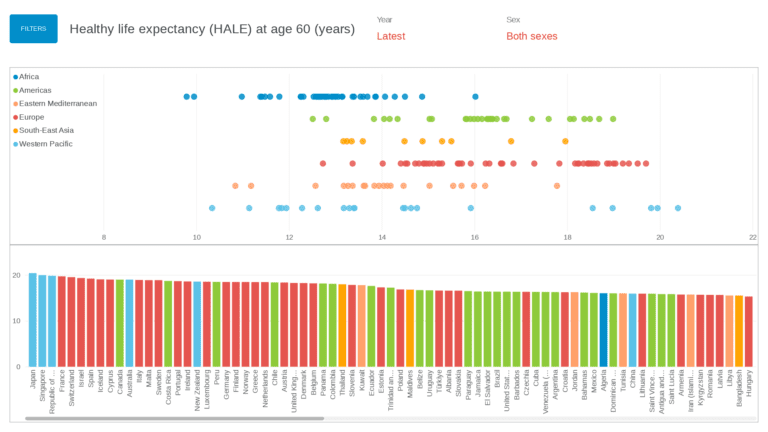Page Contents
The concept of an “expiry date” for human beings is a topic that has intrigued and haunted humanity for centuries. While we don’t have a literal expiration date like products on a shelf, our bodies do undergo a natural ageing process that can impact our health and longevity.
In this article, we will delve into the factors that influence life expectancy, how long our organs can remain in a healthy state before functional deterioration, and provide practical advice on how we can prolong the health status of our body and organs.

Understanding Healthy Life Expectancy (HALE)
Healthy life expectancy (HALE) is a statistical measure that estimates the average number of years a person is expected to live in good health based on current mortality and disability rates. It takes into account both the length and the quality of life by considering the number of years lived in good health without significant physical or mental impairment.
HALE provides valuable insights into the overall well-being and functionality of a population, reflecting the years that individuals can expect to enjoy without being limited by illnesses or disability. Similar to traditional life expectancy, HALE is influenced by various factors, including genetics, lifestyle choices, access to healthcare, and environmental conditions. Advancements in healthcare and preventive measures can also contribute to an increase in HALE, allowing individuals to live a longer and healthier life.
HALE at age 60 extracted from WHO website (Figure 1) shows that Japan, Singapore and Korea are the top 3 countries with elderly population age in good health with life expectancy close to 80 years old.

How long our organs can remain in a healthy state?
Our human body is a complex system composed of various organs, each with its own unique ageing process. Some organs, like the skin and liver, have a remarkable ability to regenerate and repair themselves, enabling them to remain in a relatively healthy state for longer periods. On the other hand, organs such as the heart and brain have limited regenerative capacities, making them more susceptible to age-related deterioration.
- Heart
The heart’s health is crucial for overall well-being, and it can remain in a relatively healthy state through middle age. However, until around 40 years, the heart muscles may weaken, leading to conditions like heart disease and heart failure. - Brain
The brain is the command center of the body, and its health is vital for cognitive function. While the brain can maintain its function well, at 60 years and above, it is susceptible to neurodegenerative diseases like Alzheimer’s and dementia. - Kidneys
The kidneys play a crucial role in filtering waste and maintaining fluid balance in our body. If we do not watch our diet, at 50 years old, kidney function may start to decline, potentially leading to chronic kidney disease. - Lungs
The respiratory system may start experiencing reduced efficiency as early as 25 years, making it more difficult to breathe and increasing the risk of respiratory conditions. - Bones
Bone density decreases as we age. Starting from 35 years, we may have increased risk of fractures and oesteoporosis.
Other parts of our body also have their finite healthy age, for example, teeth at around 40 years, vision about 40 years, liver at 70 years, intestine maybe 55 years, etc. These are just indicative numbers, often, the numbers are dependent on various factors such as genetics, lifestyle, diet, external stimuli, etc.
Beat the expiry, prolong the health status of our body
While we may not have control over our genetics, there are several lifestyle choices we can make to promote a healthier, more extended life and delay organ deterioration:
Balanced diet
Adopt a well-balanced diet rich in fruits, vegetables, whole grains, lean proteins, and healthy fats. This provides essential nutrients that support organ health and overall well-being.Regular exercise
Engage in regular physical activity and avoid sedentary lifestyle to maintain cardiovascular health, bone density, and muscle strength. Exercise also benefits brain health and can reduce the risk of functional disabilities.Avoid smoking and limit alcohol
Smoking damages the lungs and increases the risk of heart disease, while excessive alcohol consumption can harm the liver and other organs.Manage stress
Chronic stress can have detrimental effects on both physical and mental health. Incorporate stress-reduction techniques such as meditation, yoga, Tai Chi Quan, or hobbies to promote well-being.Stay hydrated
Proper hydration is essential for maintaining kidney function and overall bodily health.Regular health check-ups
Schedule regular check-ups with your healthcare provider to monitor your organ function and address any health concerns promptly.Mental stimulation
Engage in activities that challenge your brain, such as puzzles, reading, or learning new skills, to promote cognitive health.
Conclusion
While we don’t really have an expiry date in the traditional sense, our bodies and organs do undergo a natural and gradual ageing process. Life expectancies and organ health are influenced by various factors, but the choices we make in our diet and lifestyle can significantly impact our well-being and longevity.
By adopting a healthy diet and lifestyle, making informed choices, and seeking appropriate medical care, we can extend the health status of our bodies and organs, leading to a more fulfilling and vibrant life. Remember, it’s never too late to start taking care of yourself and investing in a healthier future at whatever age you are now.
